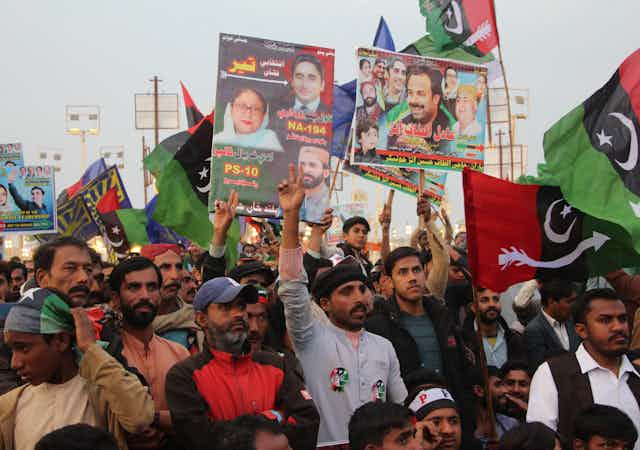Pakistanis headed to the polls on Thursday to elect a new parliament and prime minister at a time of renewed political turbulence in the country.
The country’s popular former leader, Imran Khan, has been sentenced three separate times in recent weeks to lengthy jail terms. The timing before this week’s election is intended to send a message: the military wants him out of politics using a judicial pathway.
The military, which has directly and indirectly controlled Pakistan’s politics for seven decades, appears determined to reopen the political space for two other parties in the lead-up to the vote.
These are the Pakistan Muslim League-Nawaz (PML-N) party, led by three-time former prime minister Nawaz Sharif, and the Pakistan People’s Party, led by Bilawal Bhutto Zardari, the son of former president Asif Ali Zardari and assassinated former prime minister Benazir Bhutto.
So, with Khan in prison and barred from running, which party is likely to win the election and what challenges lie ahead for the new government?
Khan’s downfall
Khan, a former cricket star, led the Pakistan Tehreek-e-Insaf (PTI) party to victory in the 2018 elections. But he lost the support of the military and was ousted in April 2022 through a no confidence vote in the National Assembly.
Since then, his party, PTI, has remained immensely popular. It dominated byelections in late 2022 to fill seats in the National Assembly that had been left vacant when PTI lawmakers resigned en masse to protest his ouster.
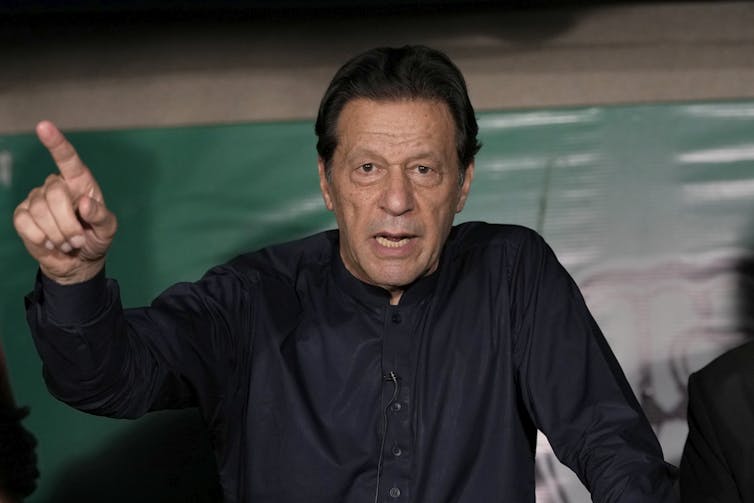
Last year, Khan was barred from politics for five years after being convicted on corruption charges. He maintains the charges were politically motivated. Then came the sentences handed down this year (it’s unclear if they will be served concurrently):
ten years in prison for breaching the Official Secrets Act
14 years in prison for failing to disclose gifts received from foreign leaders, selling them and then not disclosing the amounts earned
seven years in prison for being in an un-Islamic marriage.
With Khan barred from standing for office and no support from the military, PTI seems very unlikely to secure enough seats to return to power.
The electoral commission made things even more difficult by blocking the party’s use of the cricket bat symbol to identify its candidates. In a country with low levels of literacy, many people rely on these symbols when they cast their ballots.
The commission has instead allocated individual symbols to PTI’s candidates. This will create confusion among PTI’s supporters, who will need to know which symbols have been given to which candidates in their specific electorates.
Given the support among the youth for Khan and the PTI leadership urging its supporters to vote in the elections, the party’s candidates may still secure seats in the national and provincial assemblies. Their chances of forming a government, though, are virtually nil.
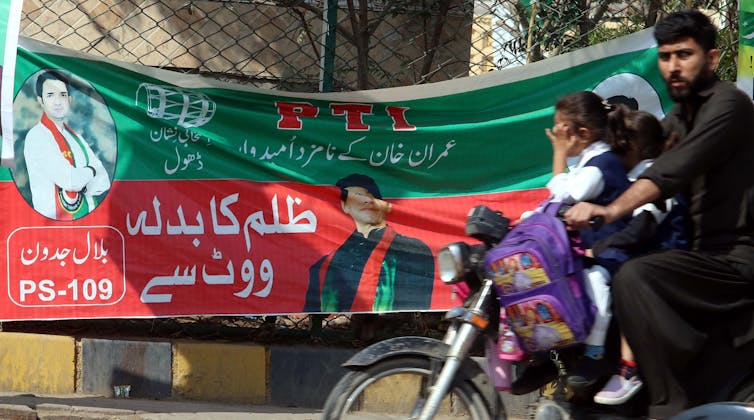
The return of an exiled former leader
Sharif, now 74 years old, is considered the frontrunner to be prime minister again – for a fourth time.
Sharif owes his initial entry into politics to the military regime led by General Muhammad Zia-ul-Haq in the 1980s. His relationship with the military since the 1990s, however, has vacillated between being cordial and antagonistic.
In fact, Sharif blamed former military and spy chiefs for orchestrating his ouster from power in 2017 when he was convicted of corruption. He was subsequently disqualified for life from participating in Pakistan’s politics.
Now he has returned from self-imposed exile to stage another political comeback. With his relationship with the military back in a “cordial” phase, the courts immediately overturned his corruption convictions when he returned to Pakistan late last year, paving his way to run in the election.
Sharif has since introduced the slogan “Pakistan ko Nawaz do”, with the dual meaning of “Give Nawaz to Pakistan” and “Be Generous to Pakistan”.
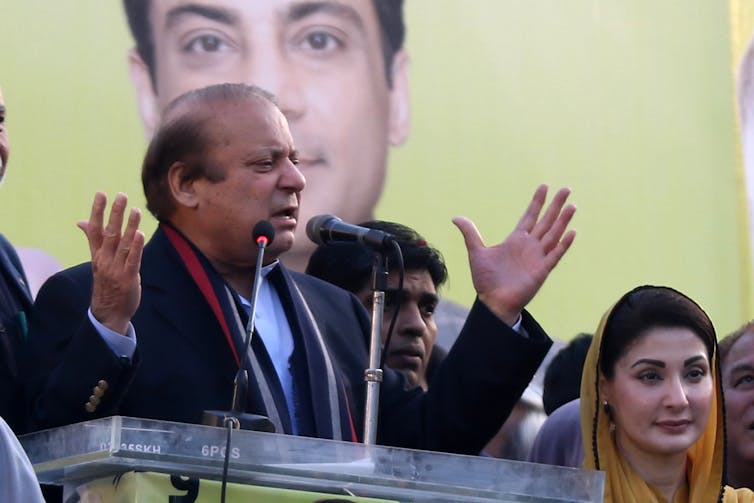
Bhutto, just 35 years old, hails from a political dynasty, which has laid the groundwork for his rise to power. As the foreign minister in the coalition government that ousted Khan, he has made his mark and is presenting himself as a symbol of new thinking (nai soch) in Pakistan.
Both candidates have been holding rallies across the country, but it remains unclear if either will be able to win a national election. PML-N is strong in Punjab in the east and PPP’s support comes mostly in Sindh in the far south-east.
As such, Pakistan appears to be heading for a coalition government, which will have to address several challenges facing the country.
A struggling economy and spiralling inflation
The most pressing issue for the new government will be to prevent further economic decline and improve the living conditions of ordinary citizens.
Pakistan’s GDP growth rate has fallen from 5.8% in 2021 to about 0.3% in 2023. At the same time, inflation has spiked against the backdrop of devastating floods in 2022, the rise in oil prices following Russia’s invasion of Ukraine, and the demands of the International Monetary Fund for more sensible economic planning and the removal of unrealistic subsidies. Rates increased from 8.9% in 2021 to a whopping 29.7% in December 2023.
Meanwhile, the rate of people living in poverty in Pakistan has climbed to nearly 40%, more than five percentage points higher than fiscal year 2022.
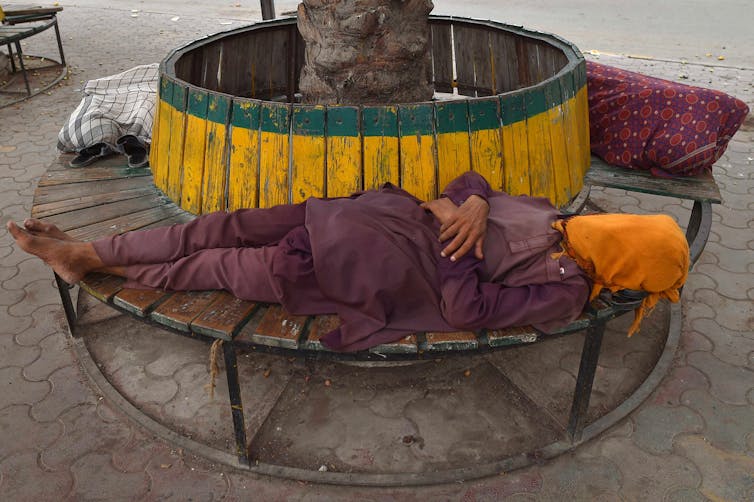
The new government will also need to revisit Pakistan’s foreign policy. Khan’s allegations of US meddling in Pakistan’s politics soured the country’s relations with Washington, while his less-than-enthusiastic approach to Chinese investment projects strained relations with Beijing.
Even the Gulf states that traditionally had good relations with Pakistan began to recalibrate their south Asian strategies, with a clear tilt towards India.
The new government will also have to devise a new approach to Afghanistan. Despite the euphoria shared by some, particularly Khan, upon the return of the Taliban to government, Islamabad’s relations with Kabul have been affected by the new regime’s reluctance to address the rise in attacks by the Pakistani Taliban (often referred to as Tehrik-e Taliban Pakistan, or TTP) and other groups.
Read more: Is terrorism returning to Pakistan?
But the most significant challenge for the new government will be the growing cynicism among Pakistanis around the legitimacy of the electoral process.
Khan’s downfall has drawn attention to the military’s ever-present need to control the government. And this has led to ordinary citizens openly criticising the military, a phenomenon unheard of before. A small minority of people in private gatherings are even questioning the legitimacy of the idea of Pakistan.
The new government will need to work hard to cement its legitimacy in such circumstances. Failing to do that would plunge Pakistan into yet another round of instability.

